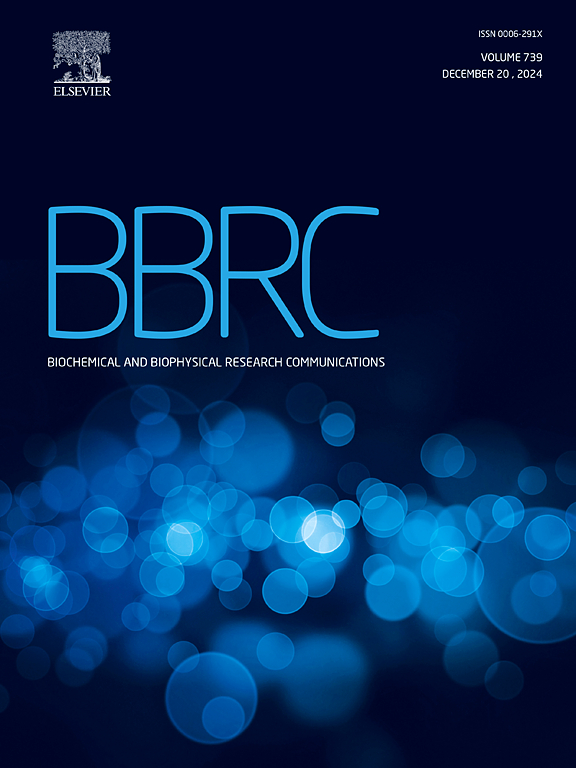RPS15a knockdown impedes the progression of B-ALL by inducing p53-mediated nucleolar stress
IF 2.5
3区 生物学
Q3 BIOCHEMISTRY & MOLECULAR BIOLOGY
Biochemical and biophysical research communications
Pub Date : 2025-04-07
DOI:10.1016/j.bbrc.2025.151768
引用次数: 0
Abstract
Ribosome biogenesis is intricately linked to the pathogenesis of B-cell acute lymphoblastic leukemia (B-ALL), but the precise regulatory mechanisms remain to be elucidated. First of all, our study identify that RPS15a, the ribosomal small subunit structural protein, is significantly higher expressed in B-ALL patients, indicating a potential crucial role of RPS15a in modulating B-ALL progression. Next in importance, our findings found that RPS15a knockdown (KD) results in the impede of cell proliferation and cell cycle progression, while concurrently inducing apoptosis of B-ALL cells. Next, we used immunofluorescence staining of nucleolar proteins NPM1 and FBL to evaluate whether RPS15a KD-mediated abnormal nucleolar ribosome assembly triggers nucleolar stress. Our findings revealed that, in comparison to control B-ALL cells, RPS15a KD disrupted the localization of NPM1 and FBL within the nucleus, altered the normal architecture of the nucleolus, and induced nucleolar stress. Mechanistically, our study found that RPS15a KD impairs the ribosomal biogenesis by suppressing the synthesis and processing of ribosomal RNAs (rRNAs), including pre-rRNA, 18S rRNA, 28S rRNA, and 5.8S rRNA. Then, we observed that the depletion of RPS15a leads to the activation of p53 signaling, accompanied by an increase in the protein expression of p53 and p21, which are critical signals that induce nucleolar stress. Furthermore, our rescue experiment involving p53 KD found that the suppression of p53, following RPS15a KD, can alleviate ribosomal biogenesis, facilitate cell cycle progression and inhibit apoptosis. In conclusion, these findings suggest that RPS15a primarily regulates the progression of B-ALL by modulating p53 signaling-mediated nucleolar stress, thereby identifying RPS15a as a critical target for B-ALL treatment.
RPS15a敲低通过诱导p53介导的核仁应激来阻碍B-ALL的进展
核糖体生物发生与b细胞急性淋巴细胞白血病(B-ALL)的发病机制错综复杂,但其精确的调控机制仍有待阐明。首先,我们的研究发现核糖体小亚基结构蛋白RPS15a在B-ALL患者中的表达显著升高,这表明RPS15a在调节B-ALL进展中可能发挥关键作用。接下来重要的是,我们的研究发现RPS15a敲低(KD)会导致细胞增殖和细胞周期进展受阻,同时诱导B-ALL细胞凋亡。接下来,我们使用核仁蛋白NPM1和FBL的免疫荧光染色来评估RPS15a kd介导的核仁核糖体异常组装是否触发核仁应激。我们的研究结果显示,与对照B-ALL细胞相比,RPS15a KD破坏了细胞核内NPM1和FBL的定位,改变了核仁的正常结构,并诱导核仁应激。在机制上,我们的研究发现RPS15a KD通过抑制核糖体rna(包括pre-rRNA、18S rRNA、28S rRNA和5.8S rRNA)的合成和加工来损害核糖体的生物发生。然后,我们观察到RPS15a的缺失导致p53信号的激活,伴随着p53和p21蛋白表达的增加,这是诱导核仁应激的关键信号。此外,我们对p53 KD的拯救实验发现,在RPS15a KD之后,抑制p53可以缓解核糖体的生物发生,促进细胞周期的进展,抑制细胞凋亡。综上所述,这些发现表明RPS15a主要通过调节p53信号介导的核核应激来调节B-ALL的进展,从而确定RPS15a是B-ALL治疗的关键靶点。
本文章由计算机程序翻译,如有差异,请以英文原文为准。
求助全文
约1分钟内获得全文
求助全文
来源期刊
CiteScore
6.10
自引率
0.00%
发文量
1400
审稿时长
14 days
期刊介绍:
Biochemical and Biophysical Research Communications is the premier international journal devoted to the very rapid dissemination of timely and significant experimental results in diverse fields of biological research. The development of the "Breakthroughs and Views" section brings the minireview format to the journal, and issues often contain collections of special interest manuscripts. BBRC is published weekly (52 issues/year).Research Areas now include: Biochemistry; biophysics; cell biology; developmental biology; immunology
; molecular biology; neurobiology; plant biology and proteomics

 求助内容:
求助内容: 应助结果提醒方式:
应助结果提醒方式:


